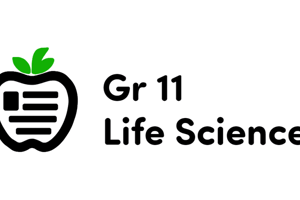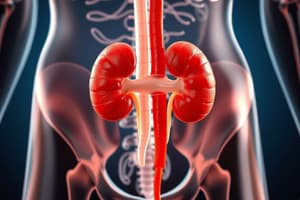Podcast
Questions and Answers
What is the primary function of the kidneys in the excretion process?
What is the primary function of the kidneys in the excretion process?
- To regulate body temperature
- To filter waste and excess water, salts, and urea from the blood (correct)
- To detoxify substances
- To absorb nutrients from the food
What is the term for organisms that produce their own food through photosynthesis?
What is the term for organisms that produce their own food through photosynthesis?
- Omnivorous
- Heterotrophic
- Autotrophic (correct)
- Carnivorous
What is the primary mode of transportation in cells that requires energy?
What is the primary mode of transportation in cells that requires energy?
- Facilitated diffusion
- Osmosis
- Active transport (correct)
- Diffusion
What is the byproduct of cellular respiration that is released into the atmosphere?
What is the byproduct of cellular respiration that is released into the atmosphere?
What is the reactant in photosynthesis that provides energy for the process?
What is the reactant in photosynthesis that provides energy for the process?
Which process is responsible for removing ammonia from the blood?
Which process is responsible for removing ammonia from the blood?
What is the term for the process of obtaining and utilizing nutrients for energy, growth, and maintenance?
What is the term for the process of obtaining and utilizing nutrients for energy, growth, and maintenance?
Which type of transport occurs across cell membranes without the use of energy?
Which type of transport occurs across cell membranes without the use of energy?
Flashcards are hidden until you start studying
Study Notes
Life Processes
Excretion
- Definition: The process of removing waste and excess substances from the body.
- Importance: Maintains homeostasis, prevents toxin buildup, and regulates ion balance.
- Organs involved:
- Kidneys: filter waste and excess water, salts, and urea from blood.
- Liver: detoxifies substances, converts ammonia to urea.
- Skin: excretes water, salts, and urea through sweat.
- Lungs: exhale carbon dioxide, water vapor.
- Intestines: absorb nutrients, eliminate waste.
Nutrition
- Definition: The process of obtaining and utilizing nutrients for energy, growth, and maintenance.
- Modes of Nutrition:
- Autotrophic: produce own food through photosynthesis (plants).
- Heterotrophic: obtain energy by consuming other organisms (animals).
- Nutrient Types:
- Macronutrients: carbohydrates, proteins, fats.
- Micronutrients: vitamins, minerals.
Transportation
- Definition: The movement of substances within an organism.
- Types of Transportation:
- Passive Transport: diffusion, osmosis, facilitated diffusion.
- Active Transport: energy-dependent transport across cell membranes.
- Importance: maintains homeostasis, regulates ion balance, and enables cellular functions.
Respiration
- Definition: The process of generating energy from glucose, releasing carbon dioxide and water.
- Stages:
- Cellular Respiration: glycolysis, citric acid cycle, electron transport chain.
- Breathing: inhalation, exhalation, gas exchange in lungs.
- Importance: generates energy (ATP) for cellular activities.
Photosynthesis
- Definition: The process of converting light energy into chemical energy (glucose).
- Equation: 6 CO2 + 6 H2O + light energy → C6H12O6 (glucose) + 6 O2
- Importance: produces oxygen, supports life on Earth, and provides energy for food chains.
Life Processes
Excretion
- Removes waste and excess substances from the body to maintain homeostasis, prevent toxin buildup, and regulate ion balance
- Kidneys filter waste and excess water, salts, and urea from blood
- Liver detoxifies substances and converts ammonia to urea
- Skin excretes water, salts, and urea through sweat
- Lungs exhale carbon dioxide and water vapor
- Intestines absorb nutrients and eliminate waste
Nutrition
- Process of obtaining and utilizing nutrients for energy, growth, and maintenance
- Autotrophic nutrition: produce own food through photosynthesis (plants)
- Heterotrophic nutrition: obtain energy by consuming other organisms (animals)
- Macronutrients: carbohydrates, proteins, fats
- Micronutrients: vitamins, minerals
Transportation
- Movement of substances within an organism to maintain homeostasis, regulate ion balance, and enable cellular functions
- Passive Transport: diffusion, osmosis, facilitated diffusion
- Active Transport: energy-dependent transport across cell membranes
Respiration
- Process of generating energy from glucose, releasing carbon dioxide and water
- Cellular Respiration: glycolysis, citric acid cycle, electron transport chain
- Breathing: inhalation, exhalation, gas exchange in lungs
- Generates energy (ATP) for cellular activities
Photosynthesis
- Process of converting light energy into chemical energy (glucose)
- Equation: 6 CO2 + 6 H2O + light energy → C6H12O6 (glucose) + 6 O2
- Produces oxygen, supports life on Earth, and provides energy for food chains
Studying That Suits You
Use AI to generate personalized quizzes and flashcards to suit your learning preferences.




